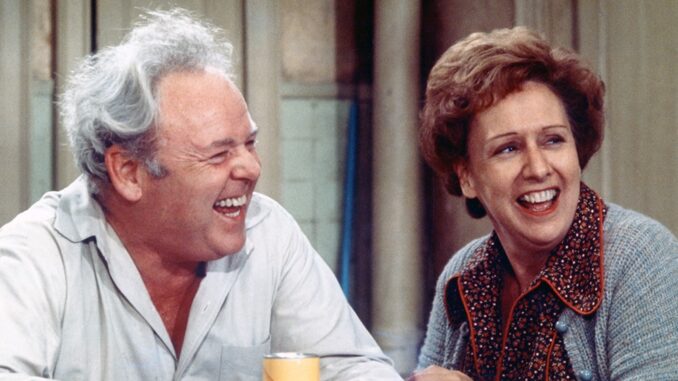
When All in the Family first aired in 1971, no one could have predicted the cultural earthquake it would cause. Created by Norman Lear, this iconic sitcom didn’t just entertain—it challenged, provoked, and forced America to look in the mirror. What made it truly remarkable wasn’t just the laughs—it was the raw, unfiltered way it tackled the social issues of its time.
From race and religion to war and women’s rights, All in the Family put it all on the table. And at the center of it all was one of the most unforgettable characters in TV history: Archie Bunker.
Archie Bunker: The Lovable Bigot Who Held Up a Mirror to Society
Archie Bunker, played masterfully by Carroll O’Connor, was more than just a character—he was a walking contradiction. A blue-collar conservative with a heart (albeit buried deep under layers of stubbornness and prejudice), Archie said what many Americans were thinking—but were too afraid to say out loud.
What made Archie so remarkable wasn’t that he was right—but that he was real. He wasn’t a villain. He was a product of his environment, his era, and his fears. And somehow, viewers loved him even as they cringed at his ignorance. He wasn’t designed to be admired—he was designed to spark conversation. And he did.
Edith, Gloria, and Mike: Voices of Reason and Rebellion
While Archie was the lightning rod, his family brought the storm. Edith Bunker, played by Jean Stapleton, was the show’s heart. Her kindness, patience, and surprising strength made her the emotional anchor of the household.
Gloria (Sally Struthers) and Mike “Meathead” Stivic (Rob Reiner) represented the new generation—progressive, idealistic, and often in direct conflict with Archie’s old-school views. Their spirited debates weren’t just entertaining—they were educational. Each episode felt like a crash course in generational tension, political evolution, and social change.
No Topic Was Off-Limits—and That Was Revolutionary
In an era when most TV shows avoided controversy, All in the Family dove straight into it. Racism, sexism, homophobia, abortion, menopause, the Vietnam War—you name it, they covered it. And they did it with honesty and (often dark) humor that was unheard of at the time.
This was not a sanitized sitcom with perfect families and tidy endings. This was real life, with messy conversations, uncomfortable truths, and hard-earned laughter.
The Legacy of All in the Family
What makes All in the Family most remarkable, even today, is its impact. It didn’t just shift the television landscape—it redefined it. The show paved the way for future socially conscious comedies like The Jeffersons, Maude, Good Times, and Roseanne. It proved that audiences were ready—hungry, even—for stories that reflected their world, not just distracted from it.
Archie Bunker is now enshrined in pop culture history. His chair sits in the Smithsonian, and his influence echoes through every sitcom that dares to be about more than just jokes.
Conclusion: Still Uncomfortable, Still Important
All in the Family remains one of the most remarkable shows in television history because it was never afraid to be uncomfortable. It respected its audience enough to trust they could handle the truth—however ugly or awkward it might be. In doing so, it didn’t just make us laugh.
It made us think.
And that’s a legacy few shows can claim.
FAQs About All in the Family
Q: Was All in the Family controversial when it aired?
Yes. Many viewers were shocked by the show’s blunt dialogue and social commentary. But that controversy is exactly what made it so impactful.
Q: Did the actors agree with Archie Bunker’s views?
Not at all. Carroll O’Connor, in particular, was politically liberal. He intentionally played Archie as someone flawed, not to be admired but understood.
Q: Why is Archie Bunker still talked about today?
Because his character captured the complexities of American identity, fear, and resistance to change—topics still relevant in today’s divided world.
Q: Is All in the Family worth watching now?
Absolutely. While some dialogue may feel dated, the themes and emotional core of the show remain powerful and eerily relevant.
